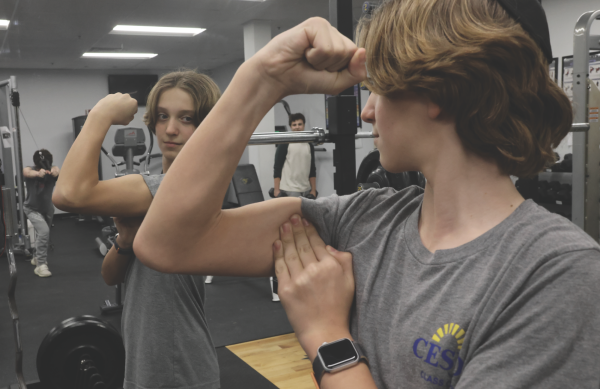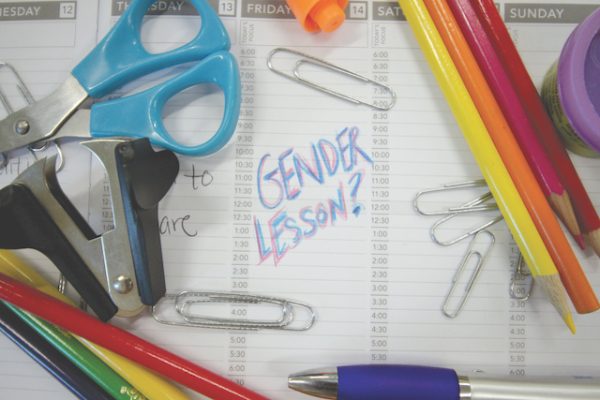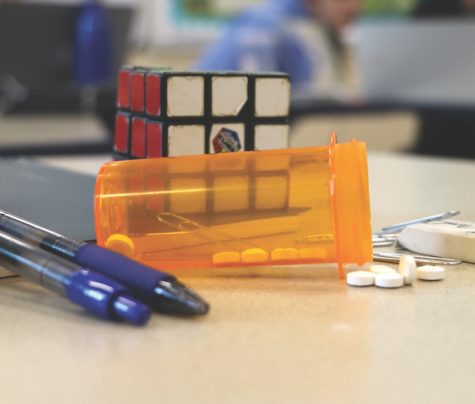Breaking down eating disorders
November 9, 2021
Uncovering Disordered Eating
As Anna* scrolled through her phone on a summer afternoon, she came across a YouTube video: “How to Lose Weight Quickly.” As a rising eighth-grader starting a new school, the video seemed like a good idea to watch, so Anna clicked on it. Little did she know her life would never be the same.
The video was a tutorial teaching people how to make themselves throw up. Anna told herself the video seemed wrong and she would never try it. She told herself that she was better than that. Later that summer, Anna found herself in an uncomfortable conversation with friends discussing weight and sizes. That night, she went home and made herself throw up for the first time.
“After meals, I would always go to the bathroom, and I learned to be very quiet. I don’t make noise when I gag anymore,” Anna said. “I’ve done it with people in the room. It’s become a little too easy to hide.”
One and a half years later, Anna still struggles with bulimia nervosa.
Although bulimia and anorexia nervosa are the most well-known eating disorders, they are far from the only ones. According to a Lion’s Tale survey of 79 out of 348 high school students, 75% of students know someone who has struggled with an eating disorder and 31.6% have experienced one themselves, including anorexia, bulimia, binge eating disorder and general disordered eating.
“It’s rarely ever about the food,” certified Nutrition Specialist (CNS) Practitioner Heidi Lyndaker said. “More often, there is some emotional component that is leading to wanting to restrict, wanting to binge, in essence, to sometimes numb feelings.”
Anna’s eating disorder stemmed from insecurities, anxiety, body dysmorphia and a desire to feel in control in her life. Anna describes body dysmorphia as looking at herself in the mirror, but instead of seeing herself, she sees herself in comparison to others. Body dysmorphia is more than feeling insecure about weight and looks; it is seeing a distorted and unrealistic view of oneself.
“The other thing that I really see that contributes to the problem is our obsession with health and this obsession that we have with demonizing food,” Lyndaker said. “‘This food is good for you.’ ‘This one is bad for you.’ ‘That one is horrible.’ ‘That one you should always eat.’ It’s a really polarized way of thinking about something that ultimately nourishes and keeps us alive.”
While significant weight loss or weight gain can be a telling sign of an eating disorder, according to Lyndaker, weight should not be the single defining factor because weight can remain the same. People with low body weight from an eating disorder often feel cold and grow lanugo, a peach-fuzz hair to keep them warm. Eating disorders also lead to nutrient and mineral deficiencies, which can have long-term effects such as an increased risk of heart failure and gastroparesis.
Other signs of eating disorders include dryness of skin, hair and lips and an irregular or loss of a menstrual cycle. Anna experienced hair loss, loss of her period and fainted multiple times. After conditioning her body to throw up after meals, she had a hard time keeping food down.
“A lot of the time when people do have an eating disorder, they cover up and act like everything is fine and make it look picture-perfect,” Anna said.
Girls are not the only ones suffering from eating disorders. The National Eating Disorder Association (NEDA) reports a study that found the ratio of eating disorders in girls to boys is 3-1. The New York Times points out that boys are facing similar problems, just using a “different language.” Instead of slimming down, boys participate in unhealthy habits to get “fit,” “muscular” or “built.”
Sports teams can also contribute to unhealthy relationships with food and exercise. In fact, according to NEDA, athletes are more likely to screen positive for an eating disorder. Many sports require a certain amount of endurance and strength, and some sports even encourage a certain body type and weight.
For example, wrestlers often have to lose or gain weight for their match, and some excessively eat or starve themselves before matches to reach the “correct” weight, according to Athletic Director Becky Silberman. Identical uniforms and jerseys become an additional mode of comparison for teens.
“Teenagers especially struggle with eating disorders primarily because of their peers and what they think society thinks is appropriate or inappropriate, so I think a lot of it comes down to the supportiveness of your teammates,” Silberman said. “If you’re on a team where a lot of people are talking all the time about what they look like in their jersey or how it feels, then I think people don’t realize what effect that has on other people.”
Many teens do not realize the effect their small comments have on individuals already struggling with eating disorders and body image. When Anna tried to confide in her friends, she did not get the reaction she was expecting.
“I don’t feel that supported socially,” Anna said. “Everytime I bring it up, my friends are like ‘I have an eating disorder too hahaha.’ Instead of being like, ‘I’m so sorry, let’s talk about it’… A lot of people don’t know how to react. There is not enough talk about it at school.”
Yet Another Consequence of COVID-19
Isolated at home during the pandemic, Elizabeth* had full access to excessive amounts of food and would continue snacking until feeling sick. She continues to suffer from binge eating disorder.
Although Elizabeth was struggling with an eating disorder before the pandemic began, being at home for extended periods of time heightened her symptoms. In a Lion’s Tale survey sent out to JDS high school students, 53.9% believe the pandemic worsened or created obsessive and extreme eating habits.
“I was doing okay for a bit and then the pandemic hit, and now I’m kinda in this cycle where I’m oscillating between counting every calorie and ‘Oh my God, this has too much of this or too much of that’, and eating so much food to the point where I feel sick,” Elizabeth said.
According to the New York Times, the NEDA helpline has had a 40% increase in overall call volume since March 2020. There was also a rise in hospitalizations for eating disorders among adolescents, specifically at Michigan Medicine where there were 125 hospitalizations among patients aged 10-23 in the first 12 months of the pandemic, as opposed to an average of 56 per year between 2017 and 2019.
Registered and licensed dietician Lori Shell, parent of alumna Samantha Shell (‘21) and junior Lindsay Shell, helps patients with a variety of weight-related struggles, including weight management, weight gain and eating disorders.
“Eating disorders are driven by the need for control, and food is something that everyone has their own control over,” Shell said. “So I think in times where people have nothing else to focus on or no control over the situation… one thing they could control is their food intake, and [the pandemic] gave them a lot of extra time to focus on food.”
As there was suddenly an abundance of time during the pandemic, people turned to social media. Many created food and exercise pages to relieve some of that boredom.
“The other major factor is social media and the pressures that we all experience with what happiness looks like, what bodies look like, what perfect looks like,” Lyndaker said. “This idea that perfect even exists is completely ludicrous.”
Being considered “trendy” has been a prominent aspect of social media. However, there is little representation of people of varying body shapes and weights.
“It’s been really difficult to feel like I’m trendy without being super skinny,” Elizabeth said.
Of the students who filled out the Lion’s Tale survey, 84.2% believe that unhealthy and unattainable eating and exercise habits are promoted on social media, harming one’s health.
“Social media glorifies and promotes the curated image and pressures teens to compare themselves to one another as well as unreal ideals, such as models in professional photographs,” high school guidance counselors Melissa Gartner and Rachel Soifer said in an email interview. “This type of cycle feeds insecurities, a drive for perfectionism and increases mental health challenges in many ways, eating disorders are one.”
Where From Here
After years of constantly thinking about how many calories were in her food and fearing that it would hurt her, Jenna*, now in recovery, is able to enjoy the food she eats and see the beneficial things it does for her body.
“I still have a very dodgy relationship with food,” Jenna said. “I sometimes still catch myself thinking maybe I shouldn’t eat this meal. Maybe I shouldn’t eat this, maybe I should eat something like a salad that’s zero calories, but I’ve been in therapy for a while now and I’ve rewired my brain to essentially understand that food is my friend. Food is energy.”
Eating disorders are not something that are necessarily curable. Recovery is challenging and almost never linear. Eating disorder recovery looks different for everybody. Some attend inpatient care where their meals are monitored, some meet with therapists and nutritionists, some seek help from family members and some battle their disorder on their own.
“I don’t think you can ever truly beat an eating disorder because it’s always going to be there and be part of your life,” Jenna explained. “You’re always going to have that little voice in the back of your head telling you, ‘don’t eat this, don’t eat that.’ But the biggest part of being in recovery is learning how to mute the voice or completely ignore it and move on and still eat. Listen to your own voice, not the voice of the eating disorder.”
Shell explained that she sets goals for her clients who are recovering from an eating disorder. In order to recover, specifically from anorexia and other restrictive eating disorders, Shell said that people have to be willing and accepting of weight gain.
“I think the number one factor is self-love and understanding what someone’s gifts are to the world and what makes them special and letting go of this idea that we all need to look alike and be alike and eat alike,” Lyndaker said. “I think it’s impossible to get to a place of true recovery without happiness.”
In the Lion’s Tale survey, when asked “have you ever tried to get help for an eating disorder?” only 15.9% answered yes. All three girls interviewed for this article explained that their families were a huge support system for them and helped them to recover. Some also said that their therapists, nutritionists and pediatricians helped them recover.
“There really needs to be a strong support system and an understanding from the key people in your life,” Lyndaker said.
While JDS cannot alone solve this issue, they can offer guidance and support to students who are suffering and feel like they need someone to talk to. Gartner and Soifer explained that counselors are there to offer supportive and healthy input and to connect students and families to outside therapy resources when needed.
“We have had students come to discuss this with us. Sometimes students are worried about themselves and other times, they are worried about a friend. In either scenario, it’s important to share concerns with us, or a trusted adult so the person can get the help and support they need to get well,” Gartner and Soifer said. “We are always so appreciative when students reach out to us and we are always eager to follow up to offer support and link students and families to resources that might be helpful.”
While Anna did not seek out help, once Anna’s parents discovered her eating disorder, they gathered a team of doctors and therapists to help her. She feels her recovery was mostly due to her parents.
Elizabeth feels fortunate she can get help from supportive family members and a therapist.
“[Recovery] is pretty hard, but it’s awesome when you feel like you don’t have to binge eat or be so particular about what you eat,” Elizabeth said. “I’m fortunate that I could get help, and having supportive family members and a great therapist helped me a lot.”
If you or a friend are suffering from an eating disorder, ask for help. Call or text (800) 931-2237, the NEDA helpline.
*Names have been changed to protect confidentiality


















